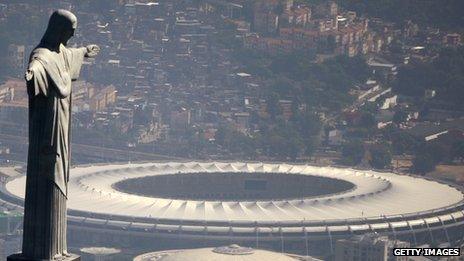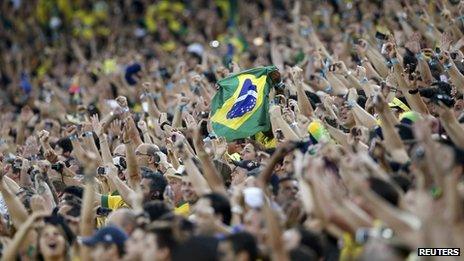World Cup 2014: Brazil prices could startle England fans
- Published

The famous Maracana stadium in Rio has been redeveloped in advance of the World Cup
With England qualifying for the 2014 World Cup, many football fans in the UK will now start planning their trip to Brazil. However, as they look for flights and hotel deals, or research prices at local restaurants, they may have a rather unpleasant surprise.
Not only has the cost of living skyrocketed in Brazil in recent years - placing Sao Paulo and Rio among the most expensive cities in the world - but prices are expected to rise further during the competition.
The problem has been a major cause of concern for some Brazilian authorities involved in the preparations for the Cup, who fear high prices could damage the country's image.
On Monday, for instance, after a media report pointed out that some domestic flights during the tournament were 10 times more expensive than flights outside the World Cup dates, the head of the country's tourism board, Embratur, proposed the adoption of price caps on plane tickets during Fifa's event.
Flavio Dino, the head of Embratur, has called for foreign airline companies to be allowed to operate domestic flights in Brazil during the competition. Currently, foreign companies can own up 20% of airlines operating domestic flights.
Opening ceremony tickets
Both suggestions were ruled out by the country's Civil Aviation Minister, Wellington Moreira Franco, but he promised to ask companies to keep prices to "reasonable levels".
According to the newspaper Folha de S. Paulo, those wishing to watch the tournament's opening ceremony, on 12 June, may have to pay US$1,095 (£680) for a 45-minute return flight from Sao Paulo to Rio - almost as much as a Sao Paulo-New York ticket or a London-Sao Paulo flight.
In September, BBC Brasil found offers of airline tickets for the same route and dates costing a quarter of this.
But it is not only plane tickets that are expected to become more expensive during the competition.
Hotel stays have also seen a dramatic increase ahead of the World Cup and visitors may have to pay up to US$200 (£125) - or more - for a stay at a mid-range hotel in Rio.
Two months ago, a study by Embratur pointed out that room rates on hotels accredited by Match - a Fifa appointed body for accommodation - would be up to five times higher during the tournaments.

The cost of living in Brazil has seen huge increases in recent years
Restaurants, bars, car parks and all sorts of services in cities hosting the games are also expected to increase their prices.
"What will probably shock visitors from London and other European capitals is that they will pay the same for certain services as in their countries, but will receive poor value for money," says economist Samy Dana, a professor at Fundacao Getulio Vargas.
Mr Dana explains that such expected high prices are partly a result of speculation and opportunism: "People see the World Cup as an opportunity to increase their profit margins for a while.
"On the other hand, visitors will also be experiencing the consequences of a local problem that has dramatically affected Brazilian families in the last years: the country's rising costs of living."
Riots
Soaring prices were among of the major grievances of Brazilians who took to the streets in June, after a rise in bus fares sparked widespread protests across the country.
According to Mercer's latest Cost of Living Survey, Sao Paulo is now the 19th most expensive city in the world, ahead of New York and just two positions below London.
Inflation is currently at about 6%, but the prices of some items such as rents and private education have increased more than that.
A recent study by Unctad, for instance, pointed out Brazil has some of the most expensive fixed and mobile broadband rates in the world. And some domestic appliances, electronic equipment and cars can cost double what they cost in Europe and the US.
According to UBS Prices and Earnings Research, workers in Rio have to work an average of 160 hours to buy an iPhone - compared with 42.5 hours in London.
So it is not a surprise that Brazilians have recently undertaken a buying spree abroad. Many middle-class couples rush to Miami or Europe to buy all sorts of house appliances as soon they get married - or baby products when the family starts to grow.
Even with the recent weakening of the country's currency, the Real, spending by Brazilians travelling abroad reached US$16.8bn in the first eight months of this year - the highest value for the period ever registered by the country's Central Bank.

Brazil's beaches are likely to be an attraction for World Cup fans
Analysts and economists generally ascribe Brazil's high prices to an array of factors.
First there is what locals call "Brazil Costs" - the elevated operational costs of doing business in Brazil due to the country's lack of infrastructure, complex bureaucracy and high taxes.
The substantial increase in the value of the Real in the last decade has also made local goods and services more expensive in dollars.
Additionally, even with the recent economic slowdown, the country's jobs market is still heated and unemployment rates have reached a record low - which has boosted domestic demand for all sorts of goods and services.
Finally, some analysts believe prices are high because Brazilian companies have been over-shielded from international competition.
"The country's policies are over-protectionist and, as a result, inefficient companies are awarded large shares of the market even if they are not competitive by international standards," Mr Dana says.
For the FGV economist, all these factors are key to understanding why prices in Brazil will probably shock foreign visitors.
"But at least tourists and foreign football fans are going to 'suffer' with such high prices just for one month. Brazilians will have to wait a long time before all these problems can be solved and we can get our prices right."
- Published9 October 2013
- Published2 October 2013
- Published26 September 2013